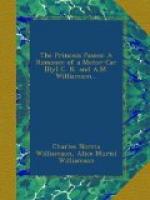If the Pass had been glorious in open day, and by falling twilight, it was doubly wonderful in this mystic dawn-time before the lamp of the rising sun had lit the valley. The green alps where the cattle pasture were faintly musical, far and near, with the ringing of unseen bells, and the air was vibrant with the rush and whisper of waters. As the shadows melted in the crucible of dawn, and an opaline high trembled on the dark mountain-tops that towered round us, I saw marvels which either had not existed last night, or I had been dull clod enough to miss them.
Fairy wild-flowers such as I had never seen studded the rocks with jewels of blue and gold, and rose, and little silver stars; and there were some wonderful, shining things of creamy grey plush, suggesting glorified thistles.
We walked through the Valley of Death, where many of Napoleon’s men had perished; and the first rays of sunrise touched the tragic rocks with the gold of hope. Up, up beyond the alps and the sparse pine-trees we climbed, until we came to the snowline, and passed beyond the first white ledge, carved in marble by the cold hand of a departed winter. Down through a gap in the mountains streamed an icy blast, and I had to remind myself, shivering, that this was August, not December. The wind tore apart the fabric of lacy cloud which had been looped in folds across the rock-face, like a veil hiding the worn features of some aged nun, and showed jagged mountain peaks, towering against a sky of mother-o’-pearl. Suddenly, after a steep ascent, we saw before us a tall, lonely mass of grey stone, built upon the rock. Behind it the sun had risen, and fired to burnished gold the still lake which mirrored the Hospice and its dark wall of mountains, seamed with snow.
The impression of high purity, of peace won through privation, and of nearness to Heaven itself, was so strong upon me, that I seemed to hear a voice speaking a benediction.
CHAPTER XI
A Shadow of Night
“This villain, . . .
He dares—I know not half he dares—
But remove him—quick!”
—ROBERT
BROWNING.
So early was it still, I feared we had come before the brotherhood were astir to receive visitors; but as I looked up at the great, grey, silent building, the noble head of a magnificent St. Bernard dog appeared in the doorway, at the top of steep stone steps. There could not have been a more appropriate welcome to this remote dwelling of a devoted band; and when the dog, after gazing gravely at the newcomers, vanished into darkness, I knew that he had gone in to tell of our arrival. I was right, too, for once within, he uttered a deep bell-note, more sonorous and more musical than lies in the throats of common dogs, and was answered by a distant baying. One could not say that these majestic animals “barked.” There was as indisputable a difference between an ordinary bark, and the sound they made, as between the barrel instrument played in the streets, and a grand cathedral organ.




